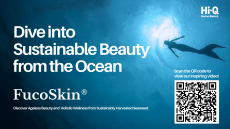‘Adaptive’ single-dose skin care the future of personalisation, says Spanish tech startup Lesielle

Founded in 2016, Lesielle’s at-home skin care device and its range of base blends and active ingredients were available on its direct-to-consumer (D2C) website and in select aesthetic and medical centres in certain European countries.
The Lesielle S device, which measured 17cm and weighed around 1kg, could be loaded with one ‘moisturising base’ and up to four active ingredient blends that were dosed, mixed and dispensed according to individual consumer needs by pressing one button. Importantly, formulas could be adapted by changing the cartridges as skin needs or environmental factors changed – drier skin in winter, for example; a need for SPF during periods of sun exposure; or actives to target hormonal pimple outbreaks. Consumers could select bases and ingredients via the website according to preferences and needs, or with the assistance of an online test or advice from a professional if necessary.
Single-dose ‘adaptive skin care’ – adding real-time adjustments to personalisation
Rubén Rubiales Vázquez, industrial pharmacist and founder and CEO of Lesielle, said the concept differed from the more traditional take on personalised skin care.
“We believe in the single-dose approach. And that allows you to change your skin care when your skin changes,” Vázquez told CosmeticsDesign-Europe.
“That’s one thing we found with the personalised skin care approach – you create it, pay a good amount for it, and after a few days your skin is oilier, and it’s not personalised anymore. Something that is not dynamically personalised is not personalised,” he said.
What Lesielle had created, he said, took personalised skin care one step further.
“Adaptive skin care is personalised skin care that adapts in real-time to your skin. It’s dynamic, personalised skin care.”
Going global to build a ‘masstige’ skin care brand
Vázquez said the current focus for Lesielle was to expand reach globally by securing new distribution partners and potentially partnering with other beauty brands. But within all of this, he said the goal remained to keep the brand firmly in the mass skin care market.
“We don’t want personalised skin care to be a premium product anymore, we want it to be mass market. Since 2016, that was the first goal – to arrive [in] the mass market.”
Each device was priced at €60, with one base and active ingredients priced at around €35. “That’s the mass market; it’s kind of masstige,” Vázquez said.
The challenge in expanding, he said, would be waiting for consumer mindsets to shift. Whilst many beauty consumers were ready and looking for personalised skin care options, using the Lesielle device required a “new way of understanding how your skin care works”, he said, particularly given it gave consumers the power to choose ingredients for themselves.
But the wider uptake of personalised skin care wasn’t just a challenge for Lesielle, it was also a challenge for the rest of the personalised beauty market – proving to consumers personalised products were better than non-personalised products and convincing them to give it a try, he said.
One thing was clear, though, Vázquez said – personalised beauty was certainly here to stay. “For me, personalisation is the future. We have seen it in all other fields.”
*This article was amended on April 6 to correctly indicate Lesielle is based in Spain, not Switzerland. The idea for the company was 'born' in Switzerland.
![Procter & Gamble has filed a patent for a hairbrush or comb that uses sensors to analyse the overall condition during grooming, feeding that back to consumers [Getty Images]](/var/wrbm_gb_food_pharma/storage/images/_aliases/wrbm_medium/publications/cosmetics/cosmeticsdesign-europe.com/article/2021/12/07/procter-gamble-patents-smart-hair-grooming-device-that-measures-condition-during-brushing/13072271-1-eng-GB/Procter-Gamble-patents-smart-hair-grooming-device-that-measures-condition-during-brushing.jpg)
![Beiersdorf's method uses basic image data, environmental data and personal data to recommend cosmetic, skin care and dermatology products targeting specific needs for a person's overall skin condition [Getty Images]](/var/wrbm_gb_food_pharma/storage/images/_aliases/wrbm_medium/publications/cosmetics/cosmeticsdesign-europe.com/headlines/brand-innovation/beiersdorf-patents-ai-skin-profiling-and-personalised-product-recommendation-method/12921746-1-eng-GB/Beiersdorf-patents-AI-skin-profiling-and-personalised-product-recommendation-method.jpg)
![Estée Lauder says its two devices improve shelf-life and product efficacy - cooling and heating preloaded formulations upon application [Getty Images]](/var/wrbm_gb_food_pharma/storage/images/_aliases/wrbm_medium/publications/cosmetics/cosmeticsdesign-europe.com/article/2021/08/20/estee-lauder-companies-patents-on-cooling-and-heating-beauty-devices/12754121-1-eng-GB/Estee-Lauder-Companies-patents-on-cooling-and-heating-beauty-devices.jpg)
![The patent-pending system has been designed to identify 'skin trends' associated with certain biomarkers, enabling highly customised formulations to be blended or product recommendations made [Getty Images]tion development and improve existing product recommendation](/var/wrbm_gb_food_pharma/storage/images/_aliases/wrbm_medium/publications/cosmetics/cosmeticsdesign-europe.com/article/2021/07/22/l-oreal-patents-protein-biomarker-analysis-and-skin-diagnostics-system-for-highly-personalised-skin-care/12668298-1-eng-GB/L-Oreal-patents-protein-biomarker-analysis-and-skin-diagnostics-system-for-highly-personalised-skin-care.jpg)





















